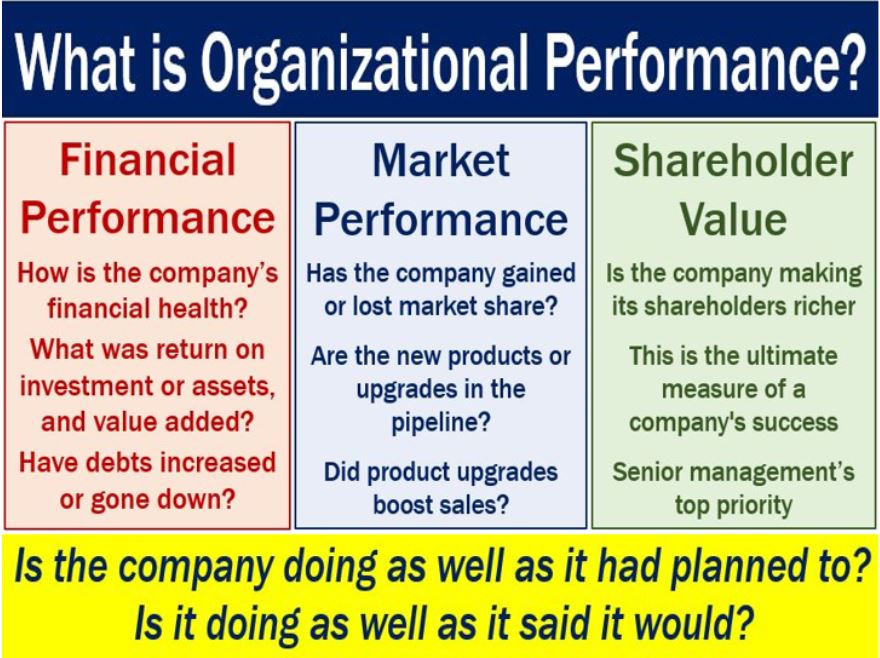Organizational performance – definition and meaning
Organizational Performance involves analyzing a company’s performance against its objectives and goals. In other words, organizational performance comprises real results or outputs compared with intended outputs. The analysis focuses on three main outcomes, first, shareholder value performance; second, financial performance; and third, market performance.
Many types of professionals, including strategic planners, focus on organizational performance.
The term has a similar meaning to ‘organizational effectiveness.’ However, ‘organizational effectiveness’ covers a broader area.
Organizational performance – two words
Let’s look at the meaning of the two words.
-
Organization
‘Organizational’ is the adjective of ‘organization.’ An organization is an organized group of individuals with a specific purpose.
-
Performance
‘Performance’ is the process or action of performing a function or task. We perceive it regarding how successfully the person carries out that function.
When we put the two words together, i.e., organizational performance, what do they mean? According to Louise James, a Senior Manager at Pitcher Partners:
“Organisation performance relates to how successfully an organized group of people with a particular purpose perform a function.”
“Essentially, this is what we are speaking about when we refer to organizational performance and achievement of successful outcomes.”

Organizational performance – three areas
Below is an explanation of the three main areas that comprise organizational performance.
-
Financial performance
Financial performance refers to measuring a company’s operations and policies in monetary terms. In other words, in terms of value in dollars, pounds, euros, etc.
We can see how good a firm’s financial performance is by looking at its return on assets and return on investment. We can also gauge its financial performance by measuring value added.
-
Market performance
Market performance measures how well a company or product performs in the marketplace. In other words, whether a product’s market share has risen, if product upgrades helped boost sales, etc.
When we are talking specifically about a product rather than the whole company, we say ‘product market performance.’
-
Shareholder value
Shareholder value performance looks at how much a company enriches its shareholders. In fact, many say it is the ultimate organizational performance measure.
Shareholder value maximization and shareholder value model mean the same as shareholder value.
Shareholder value may also refer to a company’s market capitalization.
Believers in the free market capitalist system say that shareholder value should be senior management’s top priority.
Organizational performance is increasingly linked to the company’s ability to innovate and adapt, which reflects in its capacity to develop new products and improve processes that meet evolving market demands.
According to ca.indeed.com, organizational performance:
“Refers to how well an organization is doing and how much of its daily tasks and set objectives it successfully completes. Measuring an organization’s performance involves comparing its actual outputs or results with the intended ones.”
What is an organization? If you have an organized group of people who coordinate their activities, you have an organization. In other words, they work together towards a common goal.
“Organizational” compound nouns
There are many terms in the English language that contain the word “organization,” especially compound nouns. A compound noun, such as “organizational culture,” is a term that consists of at least two words. Let’s take a look at some of them, their meanings, and how we can use them in a sentence:
-
Organizational Behavior
The study of how people interact within groups, often to improve organizations’ efficiency.
Example: “The consultant specialized in organizational behavior to better understand team dynamics and improve productivity.”
-
Organizational Culture
The values, beliefs, and attitudes that characterize a company and guide its practices.
Example: “A strong organizational culture often leads to higher job satisfaction among employees.”
-
Organizational Economics
An area of economics that considers the nature and the effects of different organizational forms.
Example: “Organizational economics provides insight into how businesses can structure themselves for optimal economic efficiency.”
-
Organizational Structure
The system that outlines how certain activities are directed to achieve the goals of an organization.
Example: “The new CEO is considering changing the organizational structure to promote more cross-departmental collaboration.”
-
Organizational Strategy
The plan crafted by the top management to guide the organization towards its long-term goals.
Example: “The board meeting focused on the development of a robust organizational strategy for the coming decade.”
-
Organizational Learning
The process of creating, retaining, and transferring knowledge within an organization.
Example: “Organizational learning is key for the company to adapt to the rapidly changing technology landscape.”
-
Organizational Effectiveness
The concept of how effective an organization is in achieving the outcomes it intends to produce.
Example: “Nonprofits often measure their organizational effectiveness in terms of impact on the community.”
Three Educational Videos
These three YouTube videos come from our sister channel, Marketing Business Network. They explain what the terms “Organizational Performance”, “Organizational Economics”, and “Organizational Culture” mean using easy-to-understand language and examples:
-
What is Organizational Performance?
-
What is Organizational Economics?
-
What is Organizational Culture?

